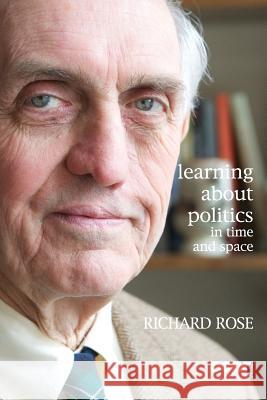Learning About Politics in Time and Space: A Memoir » książka
Learning About Politics in Time and Space: A Memoir
ISBN-13: 9781907301476 / Angielski / Miękka / 2013 / 210 str.
Richard Rose's memoir vividly describes first-hand experience of the transformation of politics in Europe and the United States since 1940. He has been teargassed in Chicago, seen walls go up in Belfast and come down in Berlin. The author's education in the streets and in the corridors of political power give a unique perspective on discrimination by race, religion and class, and the world in which political scientists live today. Rose has distilled a 500-page book into a three-minute Oval Office explanation to George W Bush of why America's intervention in Iraq was a disaster. He gives practical advice to political scientists about how to make words into concepts and communicate what you know to others inside and outside universities. The book's photographs show memorials to the dead, and living evidence of how election forecasting has changed since Delphi. Using skills developed since teaching himself to type at the age of eight, Rose describes his 20 years of working in newspapers, radio and television before publishing his first book. Since then he has combined social science methodology, along with the methodologies of comparative drama and the applied arts, to write many innovative books. This is the latest.
Richard Roses memoir vividly describes first-hand experience of the transformation of politics in Europe and the United States since 1940. He has been teargassed in Chicago, seen walls go up in Belfast and come down in Berlin. The authos education in the streets and in the corridors of political power give a unique perspective on discrimination by race, religion and class, and the world in which political scientists live today. Rose has distilled a 500-page book into a three-minute Oval Office explanation to George W Bush of why Americas intervention in Iraq was a disaster. He gives practical advice to political scientists about how to make words into concepts and communicate what you know to others inside and outside universities. The books photographs show memorials to the dead, and living evidence of how election forecasting has changed since Delphi. Using skills developed since teaching himself to type at the age of eight, Rose describes his 20 years of working in newspapers, radio and television before publishing his first book. Since then he has combined social science methodology, along with the methodologies of comparative drama and the applied arts, to write many innovative books. This is the latest. A sociologically riveting account of the development of political science... Rose shows a keen eye for the idiosyncracies of politicians and political scientists. I have learnt a huge amount from this book, and with enormous pleasure. David Soskice, LSE and Duke University Informative about past controversies and incisively extroverted about present concerns of political scientists in Europe and the US. It has much to teach those willing to learn from Richard Roses hard-earned experience. Jack Hayward, past president, UK Politics Association A fascinating insight into the working practices of one of the political science professions most prolific and distinguished scholars. It recounts the books, people, ideas, experiences, research and even the films, music and sport, that feed his boundless curiosity about the world. Ken Newton, University of Southampton and Wissenschaftszentrum Berlin für Sozialforschung Drawing on a remarkable career spanning continents and half a century, Richard Rose tells us where political science has been, and about how to practice good political science in the future. A stimulating assignment for any course in Scope and Methods. Ian McAllister, Australian National University











